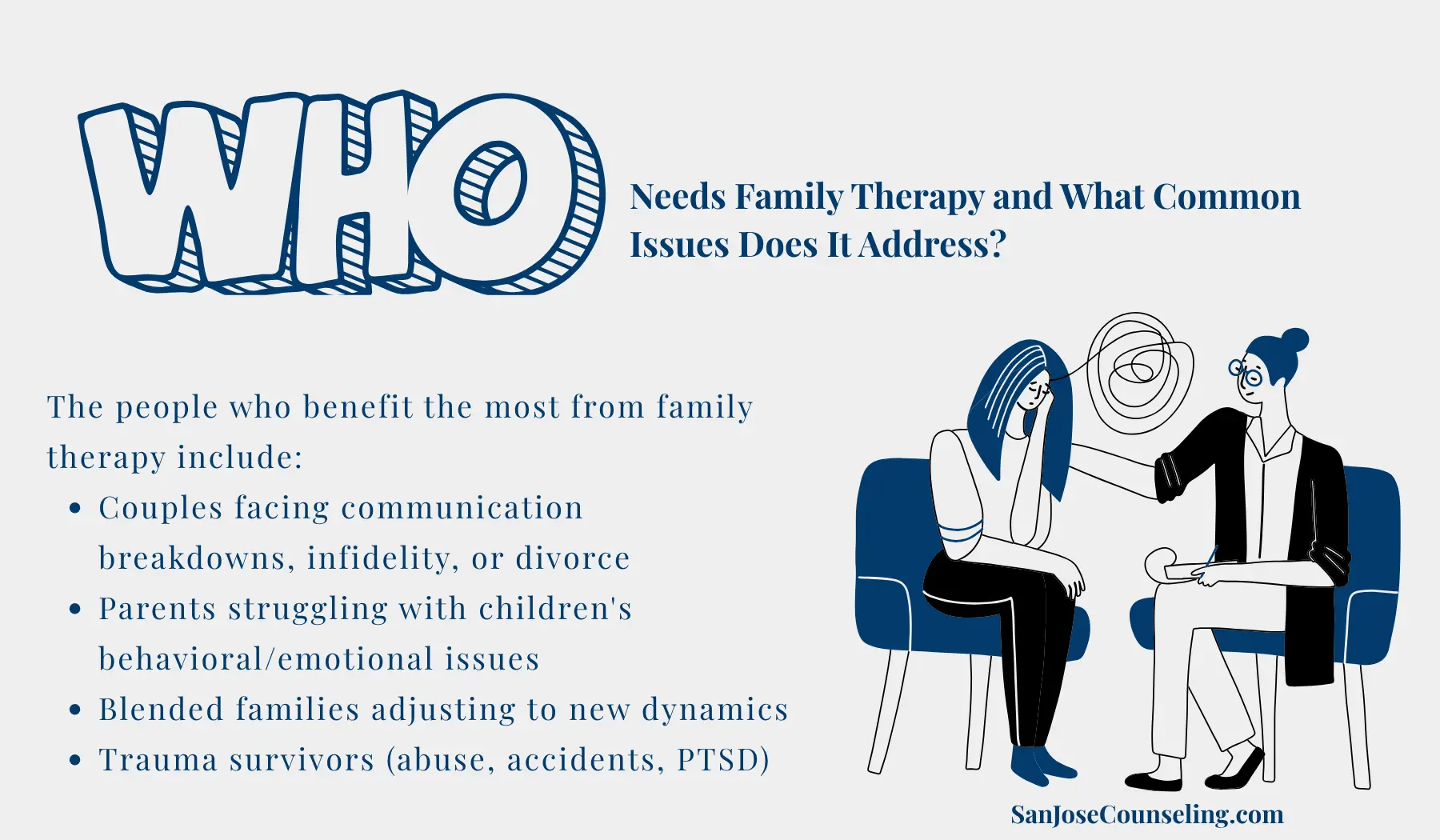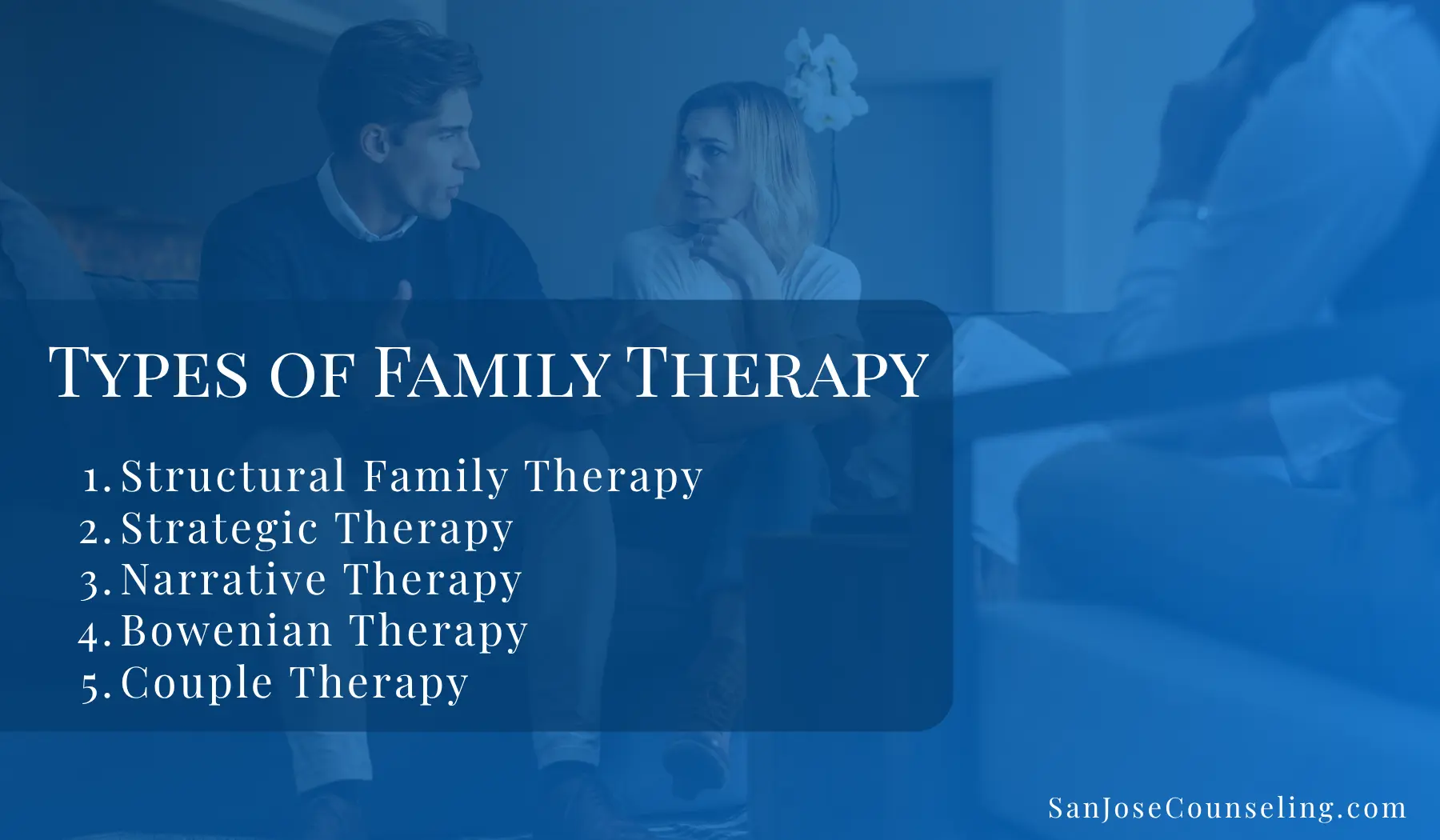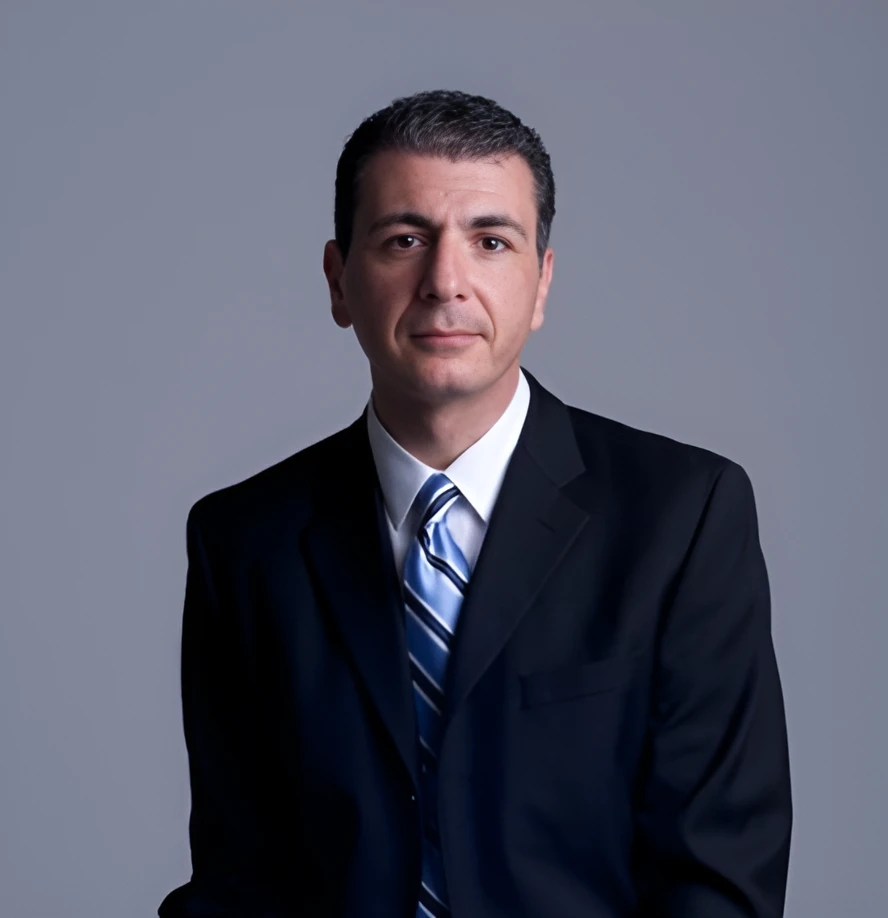Family Therapists & Psychologists in California – Healing Together
Research from AAMFT indicates that over 86% of families report that therapy helped them manage conflict and difficult emotions more effectively.
This is mostly important in California’s high-stress environment, where small family conflicts can become overwhelming stressors that affect your work-life and mental health.
Whether it's your teen's emotional instability or ongoing conflict with your spouse, this article will guide you through the essentials of family therapy—what it is, when it’s needed, what to expect, and the benefits it can offer.
Schedule a FREE consultation call with Dr. Invia – a CSAT and LMFT (licensed marriage and family therapist inSan Jose California – to start your family’s healing journey!
What is Family Therapy?

Family therapy is a distinct type of psychotherapy that seeks to improve communication, resolve arguments, and strengthen family relationships.
According to the American Psychological Association (APA), "Family therapy" describes a range of family-based interventions and programs that examine interactions and processes to improve relationship quality and functions among parents and children, couples, or extended families.
7 Key Benefits of Family Therapy
Family Therapy with San Jose Counseling can provide benefits such as:
- Better Communication – Helping family members communicate emotions in healthy, constructive ways
- Conflict Management – Decreasing recurring conflict and teaching families how to problem-solve together
- Strengthened Relationships – Repairing broken trust, healing emotional scars
- Trauma Recovery – Providing an opportunity to learn a new way to deal with PTSD, abuse, or grief as a family
- Behavioural Support – Giving parents the techniques to work through a child's emotional or behavioural issues together
- Resilience – Preparing families to work through stressors or transitions in life
- Breaking Negative Cycles – Replaces harmful patterns with healthier interactions.
Family therapy is never about blame - it is about finding solutions together. It can help you better handle divorce, addiction, or just the unpredictability of living together. It is an opportunity to heal as a family and learn how to communicate going forward.
Who Needs Family Therapy and What Issues Can It Resolve?

Family therapy can take many forms and extend beyond merely fixing a crisis. Therapy can be helpful for any family that wishes to enhance their overall relationship dynamics.
Whether you're experiencing minor disagreements or facing a big life change, therapy can give you tools to grow closer and communicate better.
The people who benefit the most from family therapy include:
- Couples facing communication breakdowns, infidelity, or divorce
- Parents struggling with children's behavioral/emotional issues
- Blended families adjusting to new dynamics
- Trauma survivors (abuse, accidents, PTSD)
It’s also recommended for families looking for relief from issues like addiction, grief, or the impact of chronic illness.
Common Issues Family Therapy Addresses
Through family therapy with Dr. Invia, you can better manage:
- Constant arguments and unresolved conflicts
- Parenting challenges and generational gaps
- Emotional distance between family members
- Life transitions (relocation, empty nest, caregiving)
- Mental health struggles (anxiety, depression, self-harm)
- Recovery from affairs, financial stress, or betrayal
Therapy provides a safe space to explore issues without blaming. It’s meant to help you work through problems together as a family.
Success Stories of Family Therapy from San Jose Counseling
Many families come to therapy because they’re struggling with their teenager’s behavior. Working with Dr. Invia’s team, they often discover underlying issues—like past trauma—that are driving those behaviors.
By using tools like EMDR and learning better ways to communicate, families start to rebuild trust and set healthy boundaries. With time and effort, many see real improvements, like fewer outbursts and a stronger sense of connection within a few months.
Your family’s breakthrough could be next. Schedule a consultation today.
Types of Family Therapy

Family therapists personalize their methods according to the family's distinctive struggles. Some of the therapy methods deal with changing behaviors, whereas others target emotional injuries or examine how the family communicates with one another.
Here are the most frequently used evidence-based approaches in California today:
1. Structural Family Therapy
This approach, developed by Salvador Minuchin, identifies family problems caused by inappropriate hierarchies and blurred boundaries.
The therapists play an active role in reordering family roles, helping parents not get overwhelmed by setting limits or bringing together disengaged family members.
If a role in a family is inappropriate, such as a child taking on the "parental" role in a single-mother family, then the therapist helps re-establish appropriate roles and limits across generations.
For example, structural family therapy might use role-play to help families practice new ways of interacting. Research shows it's particularly effective for families with defiant teens or those impacted by divorce.
2. Strategic Therapy
Pioneered by Jay Haley, this solution-focused approach addresses specific issues such as drug and alcohol abuse or avoidance of school.
Therapists will assign specific homework assignments. For example, if they are working with a couple that argues, they may suggest that they establish times when they can argue in a structured way with one another.
A classic case might be to prescribe the symptom (e.g., telling an anxious teen to intentionally worry for 10 minutes daily) to demystify the behavior. Studies show it can help with behavior issues, and most families see improvement in just 10 to 12 sessions.
3. Narrative Therapy
Michael White's method separates families from their issues by “externalizing” issues. For example, “Your family isn’t dysfunctional because depression has been controlling your actions.”
Families “externalize” their issues through a series of questions, and together they can rewrite oppressive narratives like "We are the family that never stops fighting”, by noticing and building on the times they’ve handled things differently.
This technique can be particularly effective for families struggling to let go of trauma labels or chronic illness.
4. Bowenian Therapy
Murray Bowen's model aims to reduce emotional reactivity. Bowen prescribed several methods, one being genogram mapping, where one's family tree is documented multi-generationally, which can sometimes be quite revealing (i.e., your grandfather's conflict- avoiding behavior is similar to the dynamics of your current marriage).
Bowen then asks clients to learn to respond, not react, a concept that has been shown to be useful for either enmeshed families or those with cut-off relationships.
5. Couple Therapy
This model of therapy is geared toward intimate relationships, and utilizes a variety of theories to assist couples with difficult communications, intimacy issues and breaches of trust.
Approaches such as the Gottman Method help couples discern their "Four Horsemen": criticism, contempt, defensiveness, and stonewalling, which are replaced with healthier forms of communication.
A 2011 study in the Journal of Marital and Family Therapy shows that couples therapy has a 70% success rate provided both partners are actively engaged in the process, making it a valuable tool for premarital counselling, as well as addressing infidelity, parenting challenges, and major life transitions.
What to Expect in Family Therapy in California
Family therapy follows a formal yet flexible structure designed to meet your family’s specific needs. Here is a step-by-step overview of how it usually works in California:
1. Initial Assessment (1-2 Sessions)
Your therapist will meet with all participating family members to:
- Identify core issues and relationship patterns
- Discuss family history and cultural background
- Establish shared treatment goals
- Explain confidentiality and therapy framework
2. Active Treatment Phase (Weekly/Biweekly Sessions)
Using evidence-based techniques (like those described earlier), your therapist will:
- Facilitate structured conversations to improve communication
- Assign practice exercises between sessions
- Monitor progress and adjust approaches as needed
- Help resolve conflicts in real-time during sessions
3. Progress Review & Closure
Typically after 3-6 months:
- The therapist evaluates achieved goals
- Families learn strategies to maintain positive changes.
- Sessions gradually taper off
- Optional follow-ups are scheduled
Key Considerations for California Families
In a family therapy session, the sessions usually last for 45 minutes, while more complex cases may extend to 90 minutes.
Sessions are offered entirely online to make things easier and more flexible for your family. Most families notice real progress after about 12 to 20 sessions—especially when everyone takes part and stays engaged.
Challenges You May Face:
- Initial discomfort when discussing sensitive topics
- Temporary increase in conflict as issues surface
- Scheduling coordination for multiple family members
Regardless, keep in mind that progress isn’t linear. Some sessions may feel transformative while others seem difficult, but this is entirely normal and part of the therapeutic process.
How to Find the Best Family Therapist in California
Finding the right family therapist requires careful consideration. Follow these steps to ensure you choose a qualified professional who meets your family's unique needs.
1. Start Your Search Online:
Type in "family therapist near me" or "EMDR specialist San Jose" into your search engine and see what comes up. You can also look at reputable directories, like Psychology Today, to find licensed providers with licensed reviews and specialties that match your needs.
2. Verify Credentials:
Look for a licensed marriage and family therapist (LMFT), as well as someone with specific training in family systems. Look for any additional certifications such as EMDR for trauma, or Gottman Method for couples therapy.
3. Verify Credentials:
Look for therapists with specific experience in your issues, whether trauma, addiction, or parenting. This assures you that your family is getting the most relevant and effective treatment for your situation.
4. Schedule a Consultation:
Most therapists, like Dr. Invia offer a free 15-30 minute consultation. The consultation is a great opportunity to learn about their approach and communicate what you are looking for, while also assessing if they are the right fit for you. You need to feel comfortable with them, as well as feel a sense of understanding.
5. Consider Logistics:
Decide if you are interested in in-person therapy or teletherapy (using Zoom or other technology), depending on what works best for you and your family's schedule and preferences.
After determining if the provider is a fit, confirm how much you will be paying for sessions, if the provider accepts insurance, and if they offer sliding scale rates if needed.
Bonus: 5 Key Questions to Ask
Consider asking the therapist the following questions to better decide if they are perfect for you:
- "How do you involve reluctant family members?"
- "What’s your experience with [specific issues, e.g., blended families]?"
- "How do you measure progress?"
- "What’s your cancellation policy?"
- "Do you provide homework or resources between sessions?"
Dr Invia’s team at San Jose Counseling, Inc. meets all these criteria. Book a free Family Therapy Free consultation to determine if they are the right fit for your family.
Conclusion
Family therapy has a long and successful history of helping families in California that are experiencing difficulties with communication, trauma, and transition.
By addressing communication breakdowns and other barriers to solid relationships, family therapy helps improve relationships and supports families as they move from conflict toward reconnection.
Families often seek therapy for a variety of reasons, including unresolved parenting challenges, marital conflicts, and trauma from past relationships. Having the right support from a caring professional can really help make things better.
Take the first step today: Schedule your FREE Family Therapy consultation with Dr. Invia at San Jose Counseling.
FAQs
What kind of therapy works best for family issues?
It really depends on what your family is going through. Trauma often responds well to EMDR, communication struggles might improve with EFT, and behavior challenges can benefit from strategic therapy. A caring therapist who understands your situation will help find the right approach for you.
What is the difference between family counseling and family therapy?
Counseling involves resolving an immediate problem, while therapy addresses deeper patterns in relationships and emotional wounds. Both are delivered by licensed professionals.
Why doesn't therapy work for everyone?
Therapy requires commitment to the process from every participant, guidance from experienced and professional therapists, and enough time to allow change. Putting up resistance or skipping therapy sessions can slow down your progress.


